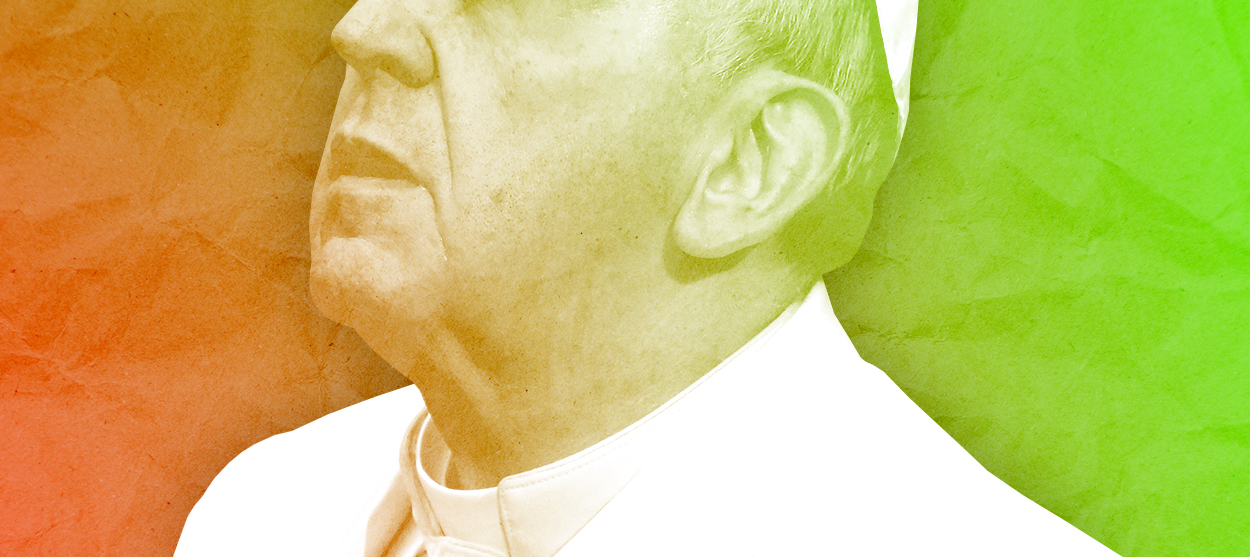The double-edged sword of Pope Francis' same-sex union comments
Civil unions are not equality


A free daily email with the biggest news stories of the day – and the best features from TheWeek.com
You are now subscribed
Your newsletter sign-up was successful
In a new documentary that premiered in Rome this week, Pope Francis expressed his support for the creation of civil unions for same-sex couples. Such relationships, Francis said, should be "legally covered."
"Homosexuals have a right to be a part of the family," the pontiff declared.
Immediately, Francis' words were hailed by many as a remarkable breakthrough for the world's largest religious organization. Understandably so. In the darkness that is 2020, the news that one of the world's most important religious figures has endorsed civil unions for same-sex couples will strike many as a rare bright moment in these very bleak times.
The Week
Escape your echo chamber. Get the facts behind the news, plus analysis from multiple perspectives.

Sign up for The Week's Free Newsletters
From our morning news briefing to a weekly Good News Newsletter, get the best of The Week delivered directly to your inbox.
From our morning news briefing to a weekly Good News Newsletter, get the best of The Week delivered directly to your inbox.
While Francis' words seem to diverge from official church teaching that regards homosexual physical relations as "disordered" and forbids same-sex relationships, legal or otherwise, they are in keeping with his prior efforts and statements on behalf of LGBTQ persons. As the archbishop of Buenos Aires, Francis, then known as Jorge Mario Bergoglio, worked behind the scenes to indicate his support for civil unions when Argentinian lawmakers were debating legalizing same-sex marriage in 2010. As Pope, Francis has been more outspoken, famously saying shortly after his installation, "who am I to judge" when it came to gay Catholics' relationship with God. Elsewhere, he has called LGBTQ young persons "children of God" and has signaled his support for priests who work on outreach to LGBTQ Catholics, something that has earned him harsh criticism from conservative Catholics.
Yet the Pope's call for same-sex civil unions should not be seen as an unabashed sign of progress. Instead, the overall effect of Francis' words may be more harmful than helpful, doing more to embolden those who seek to rescind established LGBTQ rights than they do to empower those fighting for basic civil protections for LGBTQ folks, including marriage.
No doubt, Pope Francis' statement might be very useful for changing attitudes, if not laws, in much of the world where same-sex marriage has not been legalized. According to the Council of Foreign Relations, only 28 of the world's nearly 200 countries permit same-sex marriage. In many of the countries where not only same-sex marriage remains illegal but much of homosexual life is criminalized, including most of Africa, the Catholic Church holds tremendous influence. Francis' position likely won't lead to the creation of civil unions in most of these countries — and his stance is sure to be resisted by church leaders throughout the world, including the United States — but they could help soften support for the broad array of draconian laws and customs that seriously harm LGBTQ persons in their daily lives.
In other parts of the world, especially Muslim countries, the endorsement of civil unions by the head of the Catholic Church could only further entrench opposition to LGBTQ rights there. Rather than a respected religious leader promoting tolerance, Pope Francis might be cast by religious conservatives as yet another example of the degeneracy of "the West," an embodiment of the heresy that righteous nations must resist.
A free daily email with the biggest news stories of the day – and the best features from TheWeek.com
Aside from these places, it's also worth thinking about what Francis' call for civil unions mean for nations that have already granted their LGBTQ citizens full marriage rights, especially the U.S. Back in 2010 when, before becoming Pope, he quietly lobbied Argentinian legislators to pass civil unions for LGBTQ persons instead of legalizing same-sex marriage, Francis presented the civil union option as a reasonable "compromise" the government could reach.
But in the U.S. and elsewhere, LGBTQ activists rejected civil unions for this very reason, rightly recognizing that such supposed compromises would result in a second-class status for non-heterosexual unions even as they were made to look like progress. Having long been marginalized and worse, LGBTQ Americans insisted that they would settle for nothing less than marriage when it came to how the law recognized their most important relationships.
That's why praising Francis' announcement as "beautiful" and a "step in the right direction," as many are already doing, is so misguided and even dangerous. In fact, what Francis is calling for is a significant step back from what all LGBTQ persons deserve. And in the U.S., it could unwittingly play right into the hands of conservative activists bent on rolling back basic rights for LGBTQ persons, including the right to marriage.
With the impending elevation of Amy Coney Barrett to the Supreme Court, such possibilities are no longer merely hypothetical. While Barrett carefully sidestepped questions about her position on same-sex marriage, many legal experts believe her addition to the Court will seriously threaten LGBTQ rights.
No one should believe that same-sex marriage is settled law. Instead, conservatives' strengthened advantage on the Court, thanks to Barrett, may encourage activist litigants to now seek its overturning. When that happens, one can easily imagine Justice Barrett writing the decision that justifies revoking same-sex marriage rights by presenting civil unions or even domestic partnerships as a valid alternative, a nightmare scenario now seemingly endorsed by Pope Francis himself, no less.
No question, the Pope's words are far better than what we have long heard from religious leaders when it comes to LGBTQ rights. But LGBTQ persons should never again accept the crumbs of civility in place of the basic and fundamental rights of full citizenship.
Neil J. Young is a historian and the author of We Gather Together: The Religious Right and the Problem of Interfaith Politics. He writes frequently on American politics, culture, and religion for publications including The New York Times, The Atlantic, the Los Angeles Times, HuffPost, Vox, and Politico. He co-hosts the history podcast Past Present.
-
 Why is the Trump administration talking about ‘Western civilization’?
Why is the Trump administration talking about ‘Western civilization’?Talking Points Rubio says Europe, US bonded by religion and ancestry
-
 Quentin Deranque: a student’s death energizes the French far right
Quentin Deranque: a student’s death energizes the French far rightIN THE SPOTLIGHT Reactions to the violent killing of an ultraconservative activist offer a glimpse at the culture wars roiling France ahead of next year’s elections
-
 Secured vs. unsecured loans: how do they differ and which is better?
Secured vs. unsecured loans: how do they differ and which is better?the explainer They are distinguished by the level of risk and the inclusion of collateral
